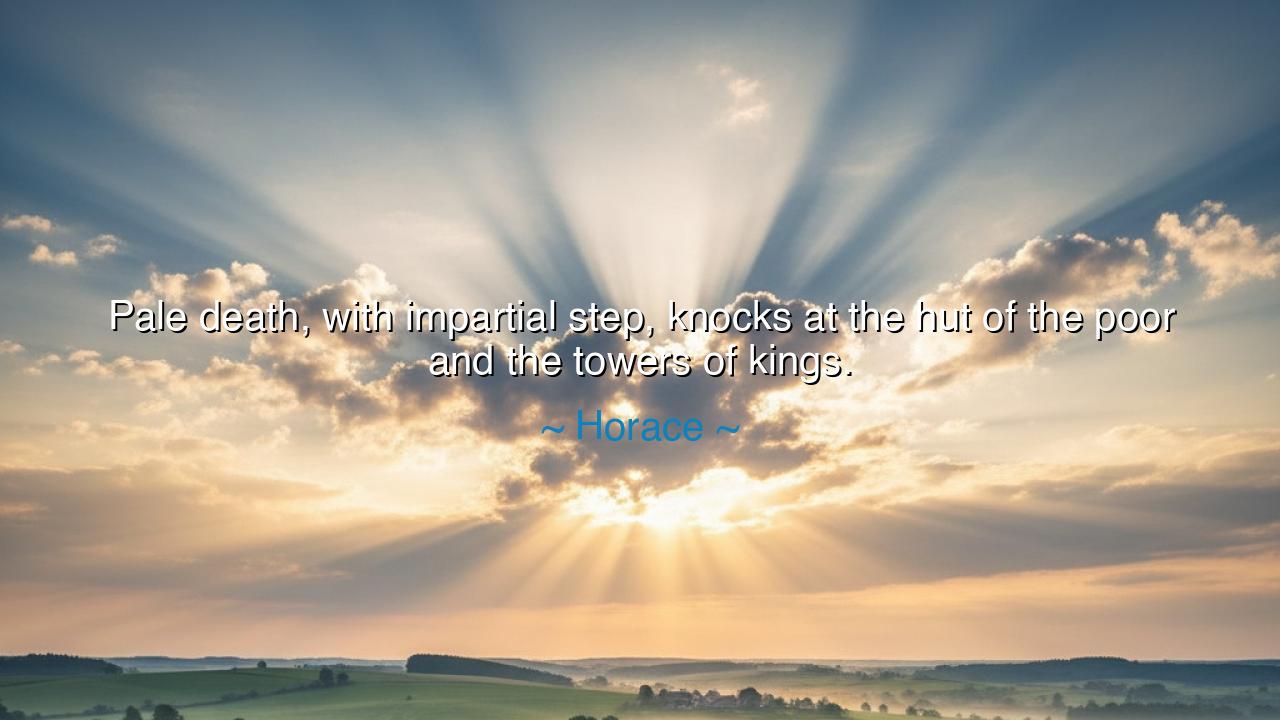
Pale death, with impartial step, knocks at the hut of the poor
Pale death, with impartial step, knocks at the hut of the poor and the towers of kings.






“Pale death, with impartial step, knocks at the hut of the poor and the towers of kings.” Thus wrote Horace, the Roman poet and philosopher of the Augustan Age, whose verses breathed both the wisdom of experience and the calm acceptance of fate. In this haunting yet noble line, he gives voice to one of the most eternal truths known to humankind: that death is the great equalizer, caring not for rank, wealth, or pride. Its shadow falls upon every threshold alike—upon the lowly hut that trembles in the wind, and upon the marble palace that gleams beneath the sun. For in the eyes of death, all men are brothers; and the power that kings hold in life is but dust in the wind of eternity.
The origin of this quote lies in Horace’s Odes (Book I, Ode IV), written in the first century before Christ, during an age of empire and ambition. Rome was then at the height of its glory—its rulers clothed in gold, its armies unconquered, its poets beloved. Yet Horace, who had seen war and the rise and fall of men, understood that beneath the grandeur of empire lay the same mortality that binds every soul. He saw soldiers and senators alike carried upon funeral pyres; he watched mighty leaders die with the same frailty as peasants. And from that vision was born his philosophy of memento mori—“remember, you must die”—a call to humility and virtue in the brief span of human life.
To call death pale is to strip it of terror, to see it as a natural force—calm, steady, and impartial. It does not rage or discriminate; it simply fulfills its law. The poet’s choice of words evokes an image of death as a silent traveler, walking through time with gentle but inevitable tread. It pauses not at gates of iron nor lingers before gilded doors. It enters quietly, the same for all—for kings upon their thrones, for slaves upon their straw beds, for lovers and soldiers, saints and sinners alike. This is not cruelty but balance, the divine symmetry of existence. For what kings possess in life is momentary, but what all men share in death is eternal.
History itself testifies to the truth of Horace’s words. Consider Alexander the Great, conqueror of worlds, who at thirty-two years of age wept that there were no more lands to subdue—only to fall, in the end, to fever and dust. His empire scattered, his body returned to the same earth as the shepherd who once tended his horses. Or think of Emperor Marcus Aurelius, philosopher-king, who ruled wisely and wrote with compassion, yet knew that his reign, too, would pass into shadow. “All that you see,” he wrote, echoing Horace’s spirit, “will soon perish; the earth will cover us all.” And so it has ever been, from Pharaoh to peasant, from Caesar to child—death’s knock is heard by all.
Yet Horace’s teaching is not of despair, but of liberation. For when one truly understands that death visits both the poor and the mighty, fear loses its grip, and vanity loses its meaning. No man can outrun his end, but every man can choose how he meets it—whether with trembling or with peace. The wise, therefore, live not in denial of death, but in awareness of it. They cherish the fleeting days, honor their duties, and fill their moments with beauty and virtue. To live as though immortal is folly; to live as though each hour is precious is wisdom.
Horace, in his calm Stoic manner, teaches that by remembering death’s impartiality, we may become more just, more humble, more alive. The man who knows he will die envies no one; he does not hoard, nor hate, nor waste. He loves simply, works honestly, and seeks no crown beyond the peace of his conscience. The man who forgets death, by contrast, becomes a slave to ambition and fear. But when we accept that the pale step comes for all, life itself grows brighter, freed from the illusions of status and possession.
The lesson, then, is this: honor life by embracing its limits. Live each day with courage and integrity, knowing that the end comes equally to kings and beggars. Let no envy poison your heart, for the grave knows no wealth. Let no pride harden your spirit, for the same wind that blows upon the palace blows upon the hut. Instead, seek meaning, not might; compassion, not conquest. In doing so, you will be prepared not only for the knock of death, but for the peace that follows it.
So, O child of time, remember the wisdom of Horace: death is impartial, but life is a choice. Build not towers of stone, but towers of virtue. For when pale death comes walking—quietly, steadily, unbound by power—it will not ask what you owned, but what you were. And if you have lived in truth, even death’s touch will not dim your light; it will only carry you from the hut and the palace alike into the boundless kingdom of eternity.






AAdministratorAdministrator
Welcome, honored guests. Please leave a comment, we will respond soon